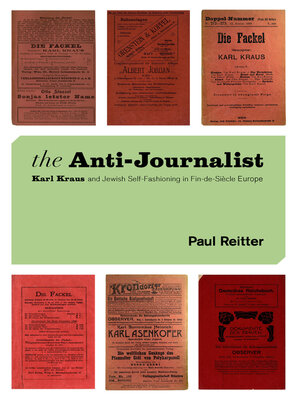The Anti-Journalist
ebook ∣ Karl Kraus and Jewish Self-Fashioning in Fin-de-Siècle Europe · Studies in German-Jewish Cultural History and Literature, Franz Rosenzweig Minerva Research Center, Hebrew University of Jerusalem
By Paul Reitter

Sign up to save your library
With an OverDrive account, you can save your favorite libraries for at-a-glance information about availability. Find out more about OverDrive accounts.
Find this title in Libby, the library reading app by OverDrive.



Search for a digital library with this title
Title found at these libraries:
| Library Name | Distance |
|---|---|
| Loading... |
In turn-of-the-century Vienna, Karl Kraus created a bold new style of media criticism, penning incisive satires that elicited both admiration and outrage. Kraus's spectacularly hostile critiques often focused on his fellow Jewish journalists, which brought him a reputation as the quintessential self-hating Jew. The Anti-Journalist overturns this view with unprecedented force and sophistication, showing how Kraus's criticisms form the center of a radical model of German-Jewish self-fashioning, and how that model developed in concert with Kraus's modernist journalistic style.
Paul Reitter's study of Kraus's writings situates them in the context of fin-de-siècle German-Jewish intellectual society. He argues that rather than stemming from anti-Semitism, Kraus's attacks constituted an innovative critique of mainstream German-Jewish strategies for assimilation. Marshalling three of the most daring German-Jewish authors—Kafka, Scholem, and Benjamin—Reitter explains their admiration for Kraus's project and demonstrates his influence on their own notions of cultural authenticity. The Anti-Journalist is at once a new interpretation of a fascinating modernist oeuvre and a heady exploration of an important stage in the history of German-Jewish thinking about identity.
Paul Reitter's study of Kraus's writings situates them in the context of fin-de-siècle German-Jewish intellectual society. He argues that rather than stemming from anti-Semitism, Kraus's attacks constituted an innovative critique of mainstream German-Jewish strategies for assimilation. Marshalling three of the most daring German-Jewish authors—Kafka, Scholem, and Benjamin—Reitter explains their admiration for Kraus's project and demonstrates his influence on their own notions of cultural authenticity. The Anti-Journalist is at once a new interpretation of a fascinating modernist oeuvre and a heady exploration of an important stage in the history of German-Jewish thinking about identity.







